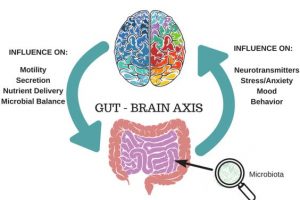72 8.2 Emerging Gut Microbiota Theories
Background:
Since Autism Spectrum Disorder (ASD) comprises of a set of heterogeneous neurodevelopmental conditions, the nature of the behavioral symptoms it presents is just as diverse (Lai, 2014). Environmental and behavioral interventions offer effective strategies to tackle ASD symptoms and are therefore, an integral part of ASD symptom management. However, such interventions require major investments in time. Given that there is a myriad of complex symptoms that might affect daily functioning and as a result, quality of life; it becomes increasingly important to find solutions that can yield short-term relief from ASD symptoms while behavioral interventions coexist. Presently, due to the interactions and complexities of various symptoms, pharmacological therapies for core autistic symptoms are limited. Moreover, for the limited pharmacologic solutions that do exist, either significant evidence of their effectiveness is lacking, or they have been shown to cause side-effects in children with ASD (Fosdick, 2017). Consequently, we now see a shift in autism research from behavioral intervention assessments to more biomedical intervention research. While this might seem counter-intuitive – because we seem to be moving away from more behavioral interventions to more biomedical approaches – this shift is really just reflective of the attempts towards finding more immediate solutions to ASD symptoms for a more efficient and evidence-based symptom management system.

The gut-brain axis and its implications for ASD research & symptom management:
Lately, one such attempt in ASD research has been rooted in the concept of the gut-brain axis. Research from the past few years has shown that the gut-brain axis is considered to play a possible role in psychiatric diseases (Sharon, 2019; Foster & McVey, 2013). It is even more recently that studies began to compare the differences in gut microbiota in children with ASD and children without ASD. Children with ASD were shown to present with modified gut microbiota and severe gastrointestinal ailments as compared to children without ASD (Sharon, 2019; Coury, 2012). While it has been established that ASD patients might show gut microbiota changes, the reverse relationship reflecting the impacts of these microbiota changes on the brain have been explored less adequately. Based on such findings from several recent studies, researchers hope to study the effects of gut microbiota changes on specific compartments in the brain that have been shown to be associated with ASD and its symptoms. They hope to do this through asking this core question – How does gut microbiota contribute to the dysregulation of brain function in individuals with ASD?

The answer to this question might have implications for several biomedical and pharmacological therapies that revolve around modifying the abnormal gut microbiome. One such potential therapy being tested is the microbiota transfer therapy. Microbiota transfer therapy involves treating dysbiotic gut microbiome through a transplant of a large number of commensal bacteria from a healthy donor (Kang, 2019). While research is ongoing on the effectiveness and the possibilities that microbiota transfer therapy can generate, there is also alternative research that aims to arrive at more drug-based solutions to solving ASD symptoms. Overall, current research reflects the idea that an identification of functional gut-brain axes and an identification of the functional links between dysregulated gut microbiota and specific functions in the brain could help us unravel more about the specific pathways in the brain that are affected by the gut microbiota. Building on these findings could further our knowledge about specific factors that drugs could target to ameliorate the negative consequences of ASD symptoms based on the gut microbiota-ASD link.
Key Takeaways
-
ASD is associated with a diverse range of behavioral symptoms that might affect daily functioning and quality of life.
-
Pharmacological therapies for core autistic symptoms are limited. This limitation leads to dependence on behavioral interventions that require significant time to show results.
-
To enable immediate, short-term relief from ASD symptoms for daily functions, ASD research is shifting towards finding more pharmacological solutions.
-
Solutions based on the gut-brain axis.
-
Core question for research : How does gut microbiota contribute to the dysregulation of brain function in individuals with ASD?
-
Implications for pharmacological targets involved in gut microbiome homeostasis.
